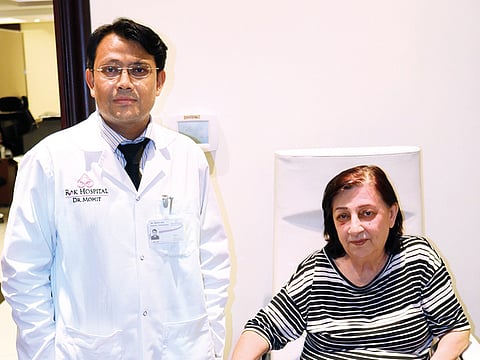Syrian woman regains sight after timely surgery
RAK Hospital surgeons restore sight of patient after two failed surgeries

Dubai
A 61-year-old Syrian patient regained vision in her right eye after surgeons in RAK hospital, UAE, conducted a complicated retinal reattachment surgery in the last week of March, a senior surgeon from the hospital said. The case was considered rare because the patient had undergone two failed surgeries in Syria to repair the retinal tear.
Wafa Jamil Boudi began experiencing light flashes and floaters in her right eye a year ago, but she did not pay much attention to them. However, when she started losing vision in the right eye and was diagnosed with retinal detachment, she underwent two surgeries within a space of a few months in Syria. Unfortunately, soon after the second surgery she experienced complete loss of sight in the eye, and she was referred to RAK Hospital.
Doctors at the hospital found that her retina had detached once again leading to severe complications, and advised immediate surgery. The case was further aggravated since the patient had been operated twice. Also, the retina had already developed epiretinal membranes, fibrosis and multiple contractions as she had sought further intervention much later.
Elaborating on the condition of Boudi, Dr Mohit Jain, vitreo-retina and cataract expert who conducted out the surgery at the hospital, told Gulf News: “The patient’s vision in the right eye had deteriorated to such a state that she could not even see her hand when held up close to her eye. On examination, we found that her retina – the layer at the back of the eyeball which sends messages to the brain to form a visual image – had detached, with several retinal breaks, This separated the retinal cells from the layer of blood vessels that provides oxygen and nourishment and was the main cause of the blindness.”
The patient was operated within a day of admission as time was of the essence in saving her right eye. “It was a complicated surgery, since once the retina gets detached from underlying eye structures, it starts to develop fibrosis and contraction. This contraction increases with time and is more pronounced in recurrent cases. Through surgery we removed all traction over the retina, repaired retinal breaks using laser techniques and placed a silicon band around the eye to allow the retina to reattach. Silicon oil was placed to support the eye. In just about a week, Wafa’s condition had improved tremendously with the retina again fully attached, and she was able to see from her right eye,” added Dr Mohit.
Dr Raza Siddiqui, CEO, Arabian Healthcare Group and Executive Director of RAK Hospital said, “This case is literally an ‘eye-opener’ for people who are facing vision problems. Discomfort in the eye should not be neglected at any cost, since timely medical intervention can save one from lifelong vision loss. At the same time, I would like to applaud the team at RAK Hospital who took immediate measures to address the patient’s problem that gave new lease to her vision”.
What is Retina Detachment?
Retinal detachments occurs when a gel-like substance (vitreous) seeps through a tear, break or hole, and collects under the retina, separating it from the underling tissue. The detached retina loses its blood supply and eventually loses the ability to send messages to the brain. As people grow older, they become more susceptible to retinal tear and detachment.
Referring to the symptoms of retinal detachment, Dr Mohit cautioned that people who experience light flashes or floaters (tiny specks that seem to drift through one’s field of vision) should consult an eye specialist at the earliest. Other symptoms include blurred vision, reduced side (peripheral) vision and a curtain-like shadow over one’s visual field. The problem is more prevalent in people who are short-sighted, have a family history of detached retina or are older than 50, or having patches of weak and thin area in retina known as lattice degeneration. Lattice degeneration is an important risk factor, and up to 30 per cent of all retinal detachments occur in eyes having lattice degeneration
Doctors advise that people with a history of eye injury or eye surgery, and having extreme short-sight are at higher risk of retinal detachment, should go for retina screening as precautionary measure if they experience similar symptoms. Retinal detachment can lead to permanent blindness if surgery is not performed promptly.



